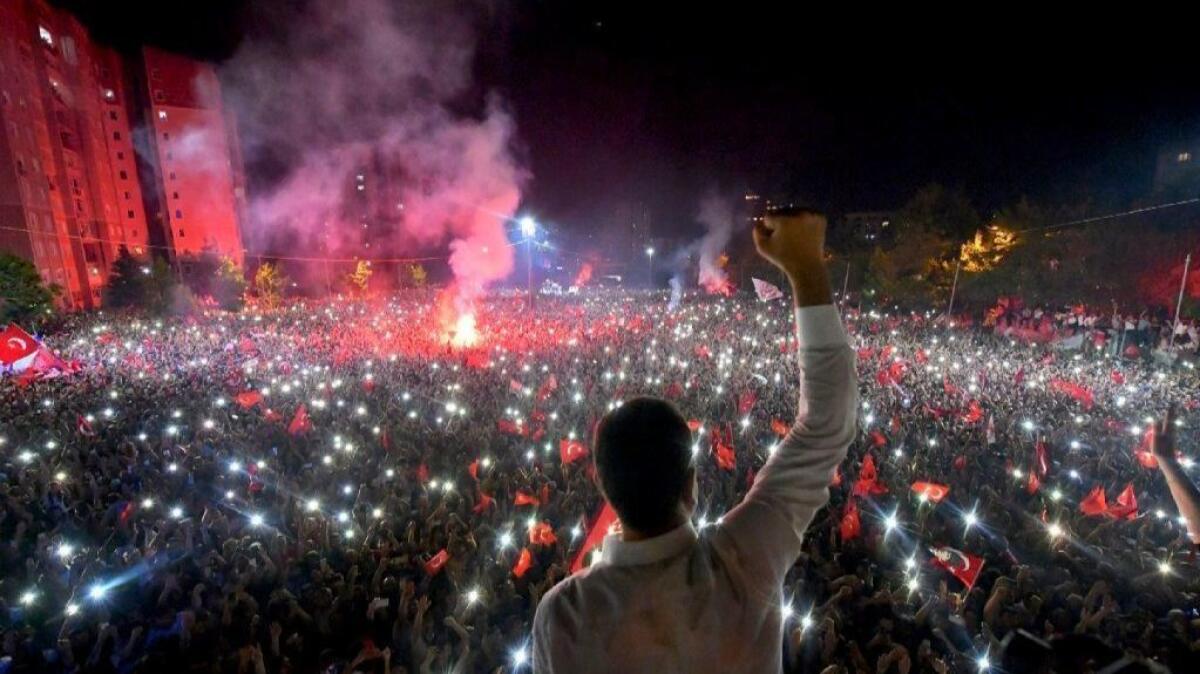How will Turkey’s authoritarian president react to opposition’s big win in Istanbul mayoral race?

First, democracy watchers in Turkey cheered. Now, they’re holding their collective breath.
In the country’s largest city, Istanbul, there were all-night, car-honking revelry after an opposition candidate won Sunday’s closely watched mayoral election in a landslide.
The result, ratified Monday, marked the most humiliating setback in years for Turkey’s authoritarian-minded president, Recep Tayyip Erdogan, who had put his own prestige on the line in stumping for the ruling party’s candidate.
For the opposition, victory was sweetened by the fact that the vote was a do-over. Its original win nearly three months ago was overturned, seemingly under pressure from Erdogan’s ruling Justice and Development Party, or AKP.
Observers called the final outcome a triumph for Turkey’s democracy, which has been increasingly beleaguered in recent years under Erdogan. The president has purged or jailed tens of thousands of people after a failed coup against him in 2016.
Critics say Erdogan has politicized the judiciary to target opponents and muzzled once-vibrant free media. In recent years he has also quarreled sharply with the European Union, a bloc Turkey once aspired to join.
The election shows “that not only democracy in Turkey is resilient but also, and more importantly, that it takes a long time to kill a democracy,” historian and author Soner Cagaptay of the Washington Institute for Near East Policy wrote on Twitter.
Ekrem Imamoglu of the Republican People’s Party, or CHP, won 54% of the vote, soundly beating the AKP’s Binali Yildrim, who took 45%. It was a far wider margin of victory than Imamoglu achieved in the original March 31 vote.
Turnout was very high — 85% — in part reflecting public unhappiness over the recount that was ordered on technical grounds by the country’s highest electoral body, widely suspected of acting at the president’s behest.
Erdogan offered congratulations to Imamoglu, and Yildrim conceded graciously even before the votes had all been tallied. But in a sign some read as ominous, Monday-morning headlines in pro-government newspapers made no reference to the opposition victory, instead merely noting that the vote had taken place.
Many ordinary Turks wondered whether Erdogan — a leader whose propensity for expanding his own powers helped earn him the nickname “the Sultan” — would find some way of undercutting the new Istanbul mayor.
The central government could take steps to sap Imamoglu’s administrative powers, or even invent a reason to charge him personally with a criminal offense of some kind, a fate that has befallen many of the president’s foes.
The Istanbul race had special significance for Erdogan, 65. It’s his hometown, and the city where he first made his mark in politics, winning the mayoralty in 1994.
Istanbul’s City Hall remained in his party’s hands as Erdogan ascended to the pinnacle of Turkish politics. He has been in control of the country for the last 16 years, first as prime minister and now as president.
With a population of more than 15 million, Istanbul is the commercial capital, accounting for nearly one-third of the Turkish economy. While the AKP has suffered defeats elsewhere, none carried the weight of the loss here.
In sweeping to victory, Imamoglu took a page from Erdogan’s old political playbook, casting himself in the role of a reformist underdog. He promised to clean up corruption, much of it blamed on associates of the president, and help the city’s poor.
Even in defeat, however, the AKP maintains a grip on many of the city’s levers of power. Istanbul is divided into 39 districts, each with its own mayor, many of them loyal to Erdogan.
But the scale of the Istanbul wipeout could shake Erdogan’s hold on nationwide power. Already, opponents within the AKP were mulling the creation of one or more breakaway factions in the same Islamist-conservative mold.
Criticism of the president, once rare, burst into the open. Mustafa Yeneroglu, an AKP parliament member from Istanbul, tweeted: “We lost Istanbul because we lost moral superiority.”
The AKP planned to hold a party leadership meeting Tuesday, and Erdogan was set to lead a major gathering of senior party officials this summer.
A darling of the West in the early years of his rule, Erdogan at first presided over an economic boom, and his devoutly Muslim followers helped cement the popularity of the Islamist-leaning AKP.
But Turkey’s finances have since faltered badly, with a debt-fueled slide into recession. Unhappiness over high inflation and unemployment helped damp support for the ruling party in the Istanbul vote.
Late into Sunday night, Imamoglu supporters celebrated across the city, lighting fireworks and blaring campaign music from cars. At City Hall, scores of riot police watched from behind barricades set up to protect the building.
In Istanbul’s Besiktas district, where Imamoglu won 84% of the vote, tens of thousands gathered in what could be described as a massive street party. Even some pro-government districts such as Uskudar, where Erdogan has his home, and Fatih, the conservative heart of the old city, switched allegiances in Sunday’s vote.
The incoming mayor sought to strike an inclusive tone. He pledged not to fire City Hall officials who backed the AKP, declaring that the municipality should be a meritocracy.
But his victory speech was also a rallying cry for a democratic revival.
“Today, 16 million Istanbul residents reinforced our belief in democracy and our trust in justice,” he told joyous supporters. “You safeguarded Turkey’s democratic reputation when the whole world was watching.”
Special correspondent Farooq reported from Istanbul and Times staff writer King from Washington.
More to Read
Start your day right
Sign up for Essential California for news, features and recommendations from the L.A. Times and beyond in your inbox six days a week.
You may occasionally receive promotional content from the Los Angeles Times.






